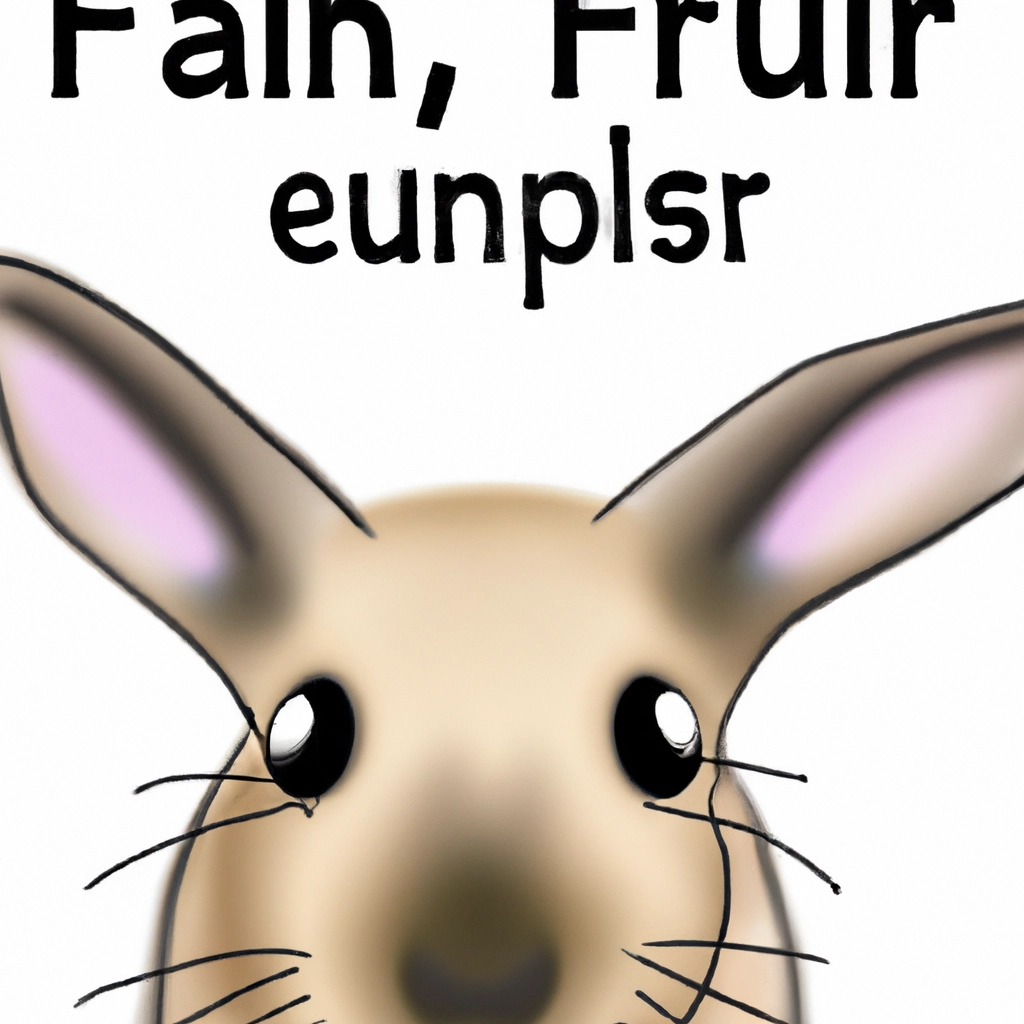| Question | Answer |
|---|---|
| Can rabbits smell fear? | Yes, rabbits have a strong sense of smell and can detect changes in human pheromones, including those associated with fear. |
| How do rabbits react to fear? | Rabbits may exhibit behaviors such as freezing, fleeing, or thumping their hind legs when they sense fear or danger. |
| Can a rabbit’s sense of smell be used to build trust? | Yes, by approaching rabbits calmly and confidently, using gentle movements and positive reinforcement, they can learn to associate human scent with safety and security. |
| Do rabbits have other keen senses? | Yes, rabbits also have excellent hearing and vision, which they rely on to detect potential threats in the environment. |
| How can humans help rabbits feel safe and secure? | Providing a quiet and comfortable living environment, along with appropriate handling and care, can help rabbits feel less stressed and fearful. |
There I was, leaning down to greet a fluffy backyard visitor, when a curious thought tiptoed into my mind. My palms were sweating, my heart racing – yes, I was a bit scared of this tiny, wild creature. It got me pondering over a fascinating question: Are rabbits capable of detecting our trepidation? I’ve always been intrigued by animal behavior, and knowing that our emotions can influence our furry companions is a game-changer in how we interact with them.
Imagine the possibilities if we could understand what goes on in those twitchy little noses. Could it transform our relationship with these beloved pets? Or perhaps even shed light on the hidden communications between humans and animals? My quest to answer these questions led me to delve into the olfactory prowess of rabbits and assess how our scent, possibly marinated in fear, might be playing a part in the rabbit-human dynamic.
Reading signals from animals has been a passion of mine, guiding me through a self-taught journey into the fascinating world of pet psychology. Let’s hop into this exploration together and uncover whether hares can indeed pick up on our fears. It’s a topic that’s not only engaging but adds a new dimension to the way we think about our furry friends.
The Sense of Smell in Rabbits
The sense of smell is king in the world of rabbits. It’s a well-known fact that these furry fluff-balls have a remarkably sharp sense of smell, which is central to their survival. Whether it’s sniffing out a carrot in the garden or the scent of a predator on the wind, rabbits rely heavily on their nose to make sense of the world around them.
In comparison to other creatures in the animal kingdom, rabbits have a pretty solid ranking in the olfactory department. Their capabilities, though not as legendary as those of bloodhounds or sharks, are still something to be admired. The twitch of the nose isn’t just adorable—it’s them sifting through the air for relevant scents.
Rabbits utilize their refined sense of smell in various ways, both in the wild and inside our cozy homes. In nature, it helps them detect food sources, avoid danger, and communicate with each other. As pets, sniffing out their favorite treats or sensing their human’s presence becomes part of their daily routine. It’s fascinating to observe just how much information they gather through their nose, and it makes one wonder about the scents they pick up from us.
Human Fear Responses and Chemical Signals
Fear is not just an emotion. It’s a cocktail of chemical signals that can set off a cascade of physiological responses. When we’re afraid, our bodies produce a variety of chemicals including adrenaline and cortisol. These are not only felt internally but can also be released into the air, potentially acting as a signal to those nearby.
Recalling a moment when a shadow startled me on an evening walk, I remember the rapid heartbeat and surge of panic. It was an intense sensation that certainly didn’t go unnoticed by me, and I’m left to wonder if the bunny in the bushes was equally aware of my alarm through the chemical signatures I unconsciously emitted.
The potential for animals to respond to the subtle chemical cues humans release when afraid has been a topic of various research studies. Although definitive evidence on rabbits specifically is scarce, there is enough curiosity in the scientific community to suggest that we’re on the brink of understanding this dynamic more thoroughly. It compels a deeper examination of how our unseen emotions might be influencing those around us, especially our long-eared companions.
Personal Experience with Observing Rabbit Behavior
Throughout my time with rabbits, both wild and domestic, I’ve been keenly observant of their behavior. I’ve noticed that they’re creatures of sensitivity, responses varying from curious approaches to sudden retreats. But was it my own nervousness that prompted these reactions?
Like the time when picking up a pet rabbit for a friend, as I felt waves of apprehension (would it like me? would I hold it correctly?), I couldn’t help but notice the rabbit’s ears perking up and its nose twitching more rapidly. I could almost read its thoughts: Is this human friend or foe?
These anecdotal experiences fuel my belief that there’s more to our interactions than meets the eye—or in this case, the nose. It raises the question, do they pick up on our anxiousness and does it affect their behavior towards us? It’s a query worth pondering, and it entices one to consider the nuances of animal-human communication.
Understanding the Impact of Human Emotions on Animal Behavior
Emotions are powerful, capable of crossing species boundaries. The notion that animals can be affected by human emotional states introduces a fascinating layer to how we approach and care for them. It highlights the impact of our internal states on our external interactions, especially with sensitive animals like rabbits.
From first-hand experience, I’ve observed that keeping a calm and steady presence seems to positively influence rabbit behavior. A nervous rabbit is more at ease when I am tranquil, proof that our own aura can set the stage for their comfort, or discomfort. This observation aligns with the idea that animals can indeed sense and react to our emotional temperament.
There’s a certain responsibility that comes with this understanding. Entering any animal’s space, we ought to be aware of the energy we bring and its potential impact. Cultivating mindfulness around our pets and approaching them with respect can lead to deeper and more harmonious relationships. It serves as a gentle reminder that we humans aren’t islands but part of a broader, interconnected ecosystem of life.
Conclusion
This exploration into whether rabbits possess the ability to detect human fear has been a rabbit hole of its own, filled with intriguing insights and personal reflections. It reiterates the importance of acknowledging the unseen threads that connect us with the animal world. By tuning into their needs and being aware of the scent trails we leave, we open up the door to more respectful and sensitive interactions.
Let’s encourage a path of empathy and consideration for our animal counterparts. We may not fully grasp the extent of their sensory experiences yet, but it’s clear that our behavior and emotions play a role in their lives. This calls for further research, but also an invitation to observe and learn from our everyday encounters.
As we continue to bond with these creatures, let’s move forward with the understanding that our fears and feelings are a shared language, influencing the world around us in profound, and sometimes fragrant, ways. It’s a journey not just of discovery, but of connection. Are you ready to follow the scent trail?
Frequently Asked Question
-
What are the signs that rabbits exhibit when they sense fear in humans or other animals?
When rabbits sense fear in humans or other animals, they may exhibit signs of stress and discomfort. These signs can include thumping their hind legs, freezing in place, or running and hiding. Additionally, they may become more skittish and may try to escape from the source of the fear. It’s important to approach rabbits calmly and gently to help them feel safe and secure in their environment.
It’s essential to pay attention to these signs and adjust your behavior to help rabbits feel at ease. By creating a calm and peaceful environment, you can help rabbits feel more comfortable and minimize their stress levels. Understanding and respecting their signals of fear can help strengthen the bond between humans and rabbits.



